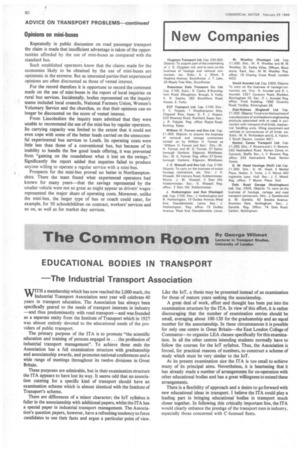ADVICE ON TRANSPORT PROBLEMS—continued Opinions on mini-buses Repeatedly in public
Page 82

If you've noticed an error in this article please click here to report it so we can fix it.
discussion on road passenger transport the claim is made that insufficient advantage is taken of the opportunities afforded by the use of mini-buses as compared with the standard bus.
Such established operators know that the claims made for the economies likely to be obtained by the use of mini-buses are optimistic in the extreme. But as interested parties their experienced opinions are often discounted as those of vested interest.
For the record therefore it is opportune to record the comment made on the use of mini-buses in the report of local inquiries on rural bus services. Incidentally, bodies represented on the inquiry teams included local councils, National Farmers Union, Women's Voluntary Service and the churches, so that their opinions can no longer be discounted on the score of vested interest.
From Lincolnshire the inquiry team admitted that they were unable to recommend the use of the mini-bus by regular operators. Its carrying capacity was limited to the extent that it could not even cope with some of the better loads carried on the unsuccessful experimental bus services to Louth. Its operating costs were little less than those of a conventional bus, but because of its inability to handle the few good loads offering, it was prevented from "gaining on the roundabout what it lost on the swings." Significantly the report added that inquiries failed to produce anyone willing to operate a regular service with a mini-bus.
Prospects for the mini-bus proved no better in NorthamptonShire. There the team found what experienced operators had known for many years—that the savings represented by the smaller vehicle were not so great as might appear as drivers' wages represented the major share of operating costs. Moreover, unlike the mini-bus, the larger type of bus or coach could cater, for example, for 50 schoolchildren on contract, workers' services and so on, as well as for market day services.




























































































































